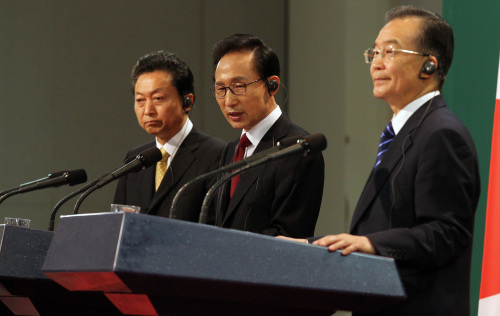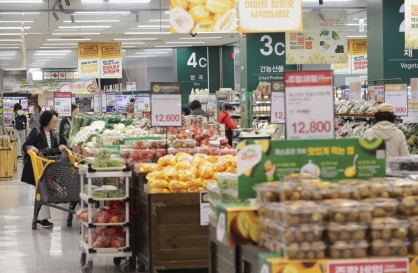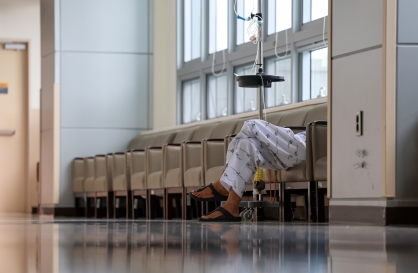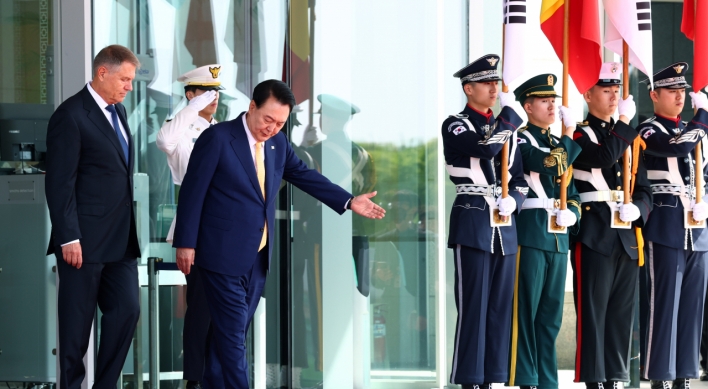JEJU ISLAND -- The leaders of South Korea, Japan and China on Sunday agreed to make joint efforts for regional security, including closer communication on tackling the North Korean nuclear crisis and its purported sinking of a South Korean warship in March.
President Lee Myung-bak, Japanese Prime Minister Yukio Hatoyama and Chinese Premier Wen Jiabao exchanged views on the Cheonan’s sinking on the second day of the two-day annual tripartite summit on the southern resort island.
President Lee Myung-bak, Japanese Prime Minister Yukio Hatoyama and Chinese Premier Wen Jiabao exchanged views on the Cheonan’s sinking on the second day of the two-day annual tripartite summit on the southern resort island.

Wen apparently faces renewed pressure from both Seoul and Tokyo to join in blaming the North for its latest naval attack on the South.
“China will make proactive efforts for closer communication and seek to tackle the (Cheonan) issue in a direction that promotes peace and stability of the Northeast Asian region,” Wen said during his speech concluding the summit.
“Without continued efforts for regional peace and security as the precondition, hard-earned progress in other areas of trilateral cooperation will disappear.”
Wen added that the three countries must closely discuss important issues, deal with sensitive matters in a proper way and solidify political trust.
President Lee said during his speech that “resolute, due procedures” must be taken in response to the alleged attack on the South Korean naval ship.
“As responsible members of the international community, Japan and China are expected to wisely cooperate in dealing with the Cheonan case,” Lee said.
“We hope to overcome the difficult times with such cooperation and seek our goal of achieving peace on the Korean Peninsula and peaceful unification.”
Mentioning Hatoyama’s proposal for stronger cooperation to create a nuclear-free world, Lee also thanked Wen for clearly explaining China’s nuclear policy as the nuclear state.
Noting that the Jeju summit served as a “firm cornerstone for promotion of substantial trilateral cooperation,” Lee said the three-way collaboration must continue to achieve the ultimate goal of creating a Northeast Asian regional bloc.
The three leaders agreed to complete a joint study on the proposed free trade agreement among the three countries by 2012 and make efforts to sign a trilateral investment pact in the near future.
The three-way summit is primarily intended to explore ways to boost regional cooperation among the Northeast Asian neighbors, which regard the European Union as a role model.
This year’s event, however, has been overshadowed by the Cheonan incident.
The 1,200-ton patrol ship was torpedoed by a North Korean submarine and sunk on March 26, according to a probe by South Korea and experts from the U.S., Sweden and Australia.
During the first session of the tripartite summit Saturday, Lee, Hatoyama and Wen agreed to set up a permanent secretariat for cooperation in Korea next year and adopted a 10-year roadmap on how to cement the trilateral partnership.
They also issued joint statements on cooperation for a common technological standardization, and for science and innovation.
The three countries issued joint statements urging businesses and experts to take part in establishing a common set of technological standards to promote trade, get rid of unnecessary technological barriers and to closely cooperate in areas of science and innovation.
They also agreed on bolstering collaboration in labor and employment, public security, low-carbon green growth as well as education by launching a “Campus Asia Initiative” for joint university degree programs.
Although the three nations have stepped up efforts to expand economic ties and other exchanges toward establishing a stronger Northeast Asian community, they do not share a common view when it comes to the region’s security landscape.
South Korea and Japan are pushing for tough penalties against Pyongyang for its provocations but China has focused more on stability. Beijing is concerned about the possibility of a massive inflow of North Korean defectors and a weakening of its influence in the region in case of political instability in Pyongyang, experts say.
In that regard, Wen’s three-day trip to South Korea, the first top-level visit by a Chinese official since the South formally pointed its finger at the North for the unprovoked attack, drew keen attention especially as Seoul prepares to bring the case to the U.N. Security Council.
In a series of meetings with the South Korean president and other senior officials, Wen reiterated that Beijing will decide its position impartially.
The three Northeast Asian nations launched the three-way summit in 1999 on the sidelines of the ASEAN Plus Three foreign ministerial talks.
They launched the trilateral summit in its current form in 2008, taking turns as host. Japan will host the next meeting.
Hatoyama and Wen are scheduled to hold a bilateral summit in Tokyo on Monday.
By Kim So-hyun (sophie@heraldcorp.com)




![[AtoZ into Korean mind] Humor in Korea: Navigating the line between what's funny and not](http://res.heraldm.com/phpwas/restmb_idxmake.php?idx=644&simg=/content/image/2024/04/22/20240422050642_0.jpg&u=)




![[Herald Interview] Why Toss invited hackers to penetrate its system](http://res.heraldm.com/phpwas/restmb_idxmake.php?idx=644&simg=/content/image/2024/04/22/20240422050569_0.jpg&u=20240422150649)

![[Graphic News] 77% of young Koreans still financially dependent](http://res.heraldm.com/phpwas/restmb_idxmake.php?idx=644&simg=/content/image/2024/04/22/20240422050762_0.gif&u=)



![[Exclusive] Korean military set to ban iPhones over 'security' concerns](http://res.heraldm.com/phpwas/restmb_idxmake.php?idx=652&simg=/content/image/2024/04/23/20240423050599_0.jpg&u=)



